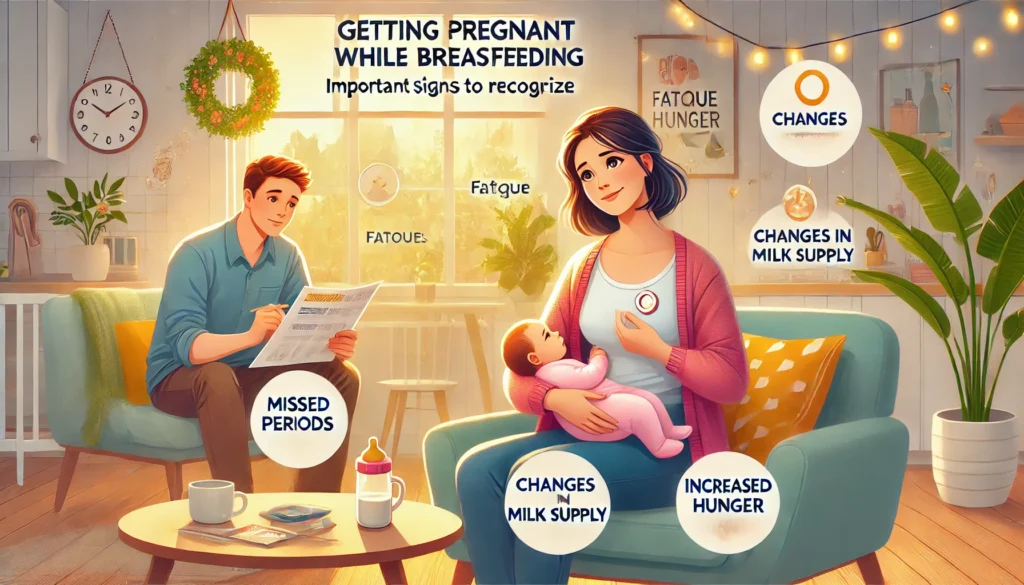Getting Pregnant While Breastfeeding: Important Signs to Recognize
Many women believe that as long as they are breastfeeding, they cannot conceive. However, the truth is that pregnancy while breastfeeding is entirely possible, especially if menstruation has resumed. Understanding the signs of pregnancy during breastfeeding will help mothers take better care of themselves and their babies.

1. Can You Get Pregnant While Breastfeeding?
Although breastfeeding can naturally suppress ovulation, it is not a guaranteed contraceptive method. The chances of getting pregnant while breastfeeding depend on several factors:
- Exclusivity of breastfeeding: If a mother exclusively breastfeeds her baby (meaning no formula or solid foods are introduced), ovulation may be delayed for up to six months. However, if breastfeeding frequency decreases, ovulation can return earlier.
- Return of menstruation: If a mother’s period has resumed, even irregularly, ovulation is likely occurring, increasing the chance of conception.
- Lactational Amenorrhea Method (LAM) effectiveness: LAM is only about 98% effective when followed strictly (exclusive breastfeeding, baby under six months old, and no menstrual period). Once any of these conditions change, pregnancy becomes more likely.
2. Signs of Pregnancy While Breastfeeding
If a breastfeeding mother conceives again, her body will experience changes due to pregnancy hormones. Some common signs include:
- Decreased milk supply: Pregnancy hormones can reduce milk production, leading to a noticeable change in milk quantity.
- Changes in milk taste: Some babies may reject breast milk due to altered taste caused by hormonal fluctuations.
- Tender or sore breasts: Hormonal changes can make the breasts feel more sensitive or painful, especially during nursing.
- Fatigue: Caring for a baby while being pregnant can cause extreme exhaustion due to increased energy demands.
- Nausea and morning sickness: Some mothers experience nausea, similar to typical early pregnancy symptoms.
- Menstrual irregularities: If a mother has resumed her period and it suddenly stops or becomes irregular, pregnancy may be a possibility.
- Mild cramps and implantation bleeding: Some women notice light spotting or cramping when the fertilized egg implants in the uterus.
3. Is It Safe to Continue Breastfeeding While Pregnant?
In most cases, breastfeeding during pregnancy is safe. However, there are a few concerns that mothers should be aware of:
- Nutritional needs: Pregnancy and breastfeeding both require extra nutrients. Mothers should maintain a healthy diet rich in proteins, vitamins, and minerals to support both the growing fetus and the nursing baby.
- Uterine contractions: Breastfeeding stimulates oxytocin release, which can cause mild uterine contractions. While this is generally safe in a healthy pregnancy, women with a history of preterm labor or miscarriage should consult their doctor.
- Increased fatigue: Pregnancy can cause exhaustion, and combined with the demands of breastfeeding, it may be overwhelming for some mothers.
4. When Should You Stop Breastfeeding?
Although many women successfully breastfeed throughout pregnancy and even tandem feed after birth, some situations may require weaning:
- Risk of preterm labor: If the doctor advises against breastfeeding due to uterine contractions or a high-risk pregnancy.
- Severe fatigue and health concerns: If breastfeeding significantly impacts the mother’s health and energy levels.
- Decreased milk production: If the supply is too low and no longer meets the baby’s needs.
5. Managing Pregnancy While Breastfeeding
For mothers who choose to continue breastfeeding while pregnant, here are some helpful tips:
- Eat a well-balanced diet to ensure adequate nutrition for both the baby and fetus.
- Stay hydrated to maintain milk supply and overall health.
- Get enough rest to manage fatigue and avoid exhaustion.
- Consult a doctor if experiencing any unusual symptoms, such as severe cramps or significant milk supply reduction.
Conclusion
Pregnancy while breastfeeding is not uncommon, and while it presents some challenges, it is manageable with proper care. By recognizing early pregnancy signs, understanding the safety aspects of breastfeeding while expecting, and maintaining a healthy lifestyle, mothers can ensure the well-being of both their current baby and their growing fetus. If there are any concerns, consulting a healthcare provider is always recommended.






